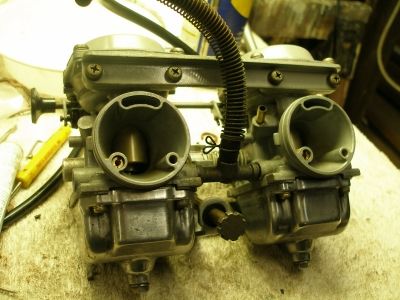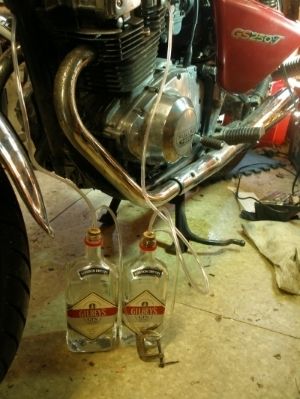 Don't dip anything that looks like rubber that you need to keep. I disassemble the slides and clean the needle parts separate from the slide/diaphragm assembly.
Don't dip anything that looks like rubber that you need to keep. I disassemble the slides and clean the needle parts separate from the slide/diaphragm assembly.
Announcement
Collapse
No announcement yet.
TIme to deep clean my carbs?
Collapse
X
-
You should be able to just throw the carbs in the dip once disassembled. No concern on the shaft seals but be careful and don't put any of the choke plungers or the choke shaft seals into the dip. It will destroy them. With that said, I like to throw anything in that I need to remove the O-rings on with the O-rings still attached. Things like fuel connectors, float seats and such. Makes getting the O-rings off MUCH easier. Don't dip anything that looks like rubber that you need to keep. I disassemble the slides and clean the needle parts separate from the slide/diaphragm assembly.
http://img633.imageshack.us/img633/811/douMvs.jpg
Don't dip anything that looks like rubber that you need to keep. I disassemble the slides and clean the needle parts separate from the slide/diaphragm assembly.
http://img633.imageshack.us/img633/811/douMvs.jpg
1980 GS1000GT (Daily rider with a 1983 1100G engine)
1998 Honda ST1100 (Daily long distance rider)
1982 GS850GLZ (Daily rider when the weather is crap)
Darn, with so many daily riders it's hard to decide which one to jump on next.;)
JTGS850GL aka Julius
GS Resource Greetings
-
Well, I whittled a new plug.
P1011188_zps7d84f07d.jpg
I sure wish the "howto" warned that there was a plug that would drop out. I assumed that the disk was pressed in like the cover over the mixture screw, not gently resting on a subtle ledge. And the part wasn't even available!Mark Fisher
sigpic
Comment
-
Seems like some are pressed in and some rely on the O-ring and pressure to keep it seated. I have several sets of carbs that have no loose plug and no way to put an O-ring between it and the gasket. I have had other carbs that the plugs did fall out but those seemed to be more recessed then the ones that need the O-ring. Can someone verify that some carbs didn't need the O-ring between it and the float bowl gasket? I've tried to remove them and they just seemed to be pressed or staked in place.http://img633.imageshack.us/img633/811/douMvs.jpg
1980 GS1000GT (Daily rider with a 1983 1100G engine)
1998 Honda ST1100 (Daily long distance rider)
1982 GS850GLZ (Daily rider when the weather is crap)
Darn, with so many daily riders it's hard to decide which one to jump on next.;)
JTGS850GL aka Julius
GS Resource Greetings
Comment
-
Back on the road again!
Just a couple of "oopsies":
#1: In spite of Mr. Haynes' warning, I lost the choke rod detent balls. Fortunately, they don't actually have to be spheres, so I cut off two finish nail heads to provide the needed tension above the detent springs.
After assembling the gang of two,

#2: I realized I had two hoses left over. Some cogitating showed where they plugged in (slightly complicated by the fact that they plugged in to different places on each carb).
Fitted it back on the bike, rigged up an "IV" using this:
Measu-funnel_zpsc39737a8.jpg
Only catch is that is has a mesh screen above the shut-off. The gasket can't seal against the mesh, and gasoline seeps right through. Without the mesh, everything works perfectly.
Got it running, and synch'd the carbs:

... all good!
Assembled the tank & seat, rode away, and...
#3: Died .5 mi from home, at the bottom of a 200' hill. Nothing would light it. Pushed it home, set it up to store, and commenced cleaning the workbench. Hmmm, there's the fuel line spring... Oh! The fuel line needs to be connected to the tank!
Actually attached the fuel tank to the carburetors, and, mirabile dictu, Suzi runs beautifully. What a way to end the year.
Thank you all for your input!Mark Fisher
sigpic
Comment
-
 robbiem1961
robbiem1961
have you tried the fuel tap assembly; cleaned the filter; is the vacuum pipe and spigot in good condition; not too short or kinked; when you suck on the pipe does it open the fuel tap and allow fuel to flow;
take out the drain plugs from the carburetor bowls and see whats in them; hopefully they'll be clean whilst they're out i turn the fuel tap to prime and let petrol wash through unhindered for 15-20 seconds to 'maybe' wash out any foreign 'stuff'
are the petrol lines of the correct grade for fuel lines; some rubber/plastic/synthetic hose can be and is broken down by petrol and deposited in the carbs; if this is a problem then you will have to strip and clean the carbs ;
it sounds like your not getting fuel through and wonder if you have a damaged float; sticking needle;
Comment
-
That's a nice overview of fuel problem diagnostics. In fact, I strongly suspect the original problem was 30 years' accumulation of powder-fine rust particles in the idle jets and main jets. That's what I found when I disassembled the carbs. The big problem on my first "post-repair" ride was actually attaching the fuel tank to the carburetors. I had done all the tweaking using the IV, and I got well away from the house before I ran out of fuel in the fuel bowl.Originally posted by robbiem1961 View Posthave you tried the fuel tap assembly; ... it sounds like you're not getting fuel through and wonder if you have a damaged float; sticking needle;
I will put an examination of the fuel tap on the "do soon" list.Mark Fisher
sigpic
Comment
-
Just wanted to cap this thread with a "thanks" to helpful responders.
"Deep clean" was the right thing to do. I was zooming around yesterday, and Suzi's response was better than I ever remember it. I'm afraid it's easy for me to take her for granted, but she sure responds to occasional focused attention!Mark Fisher
sigpic
Comment
.png)
Comment